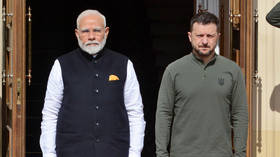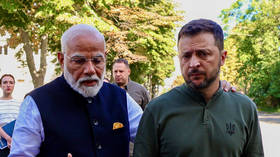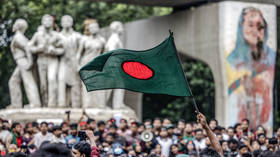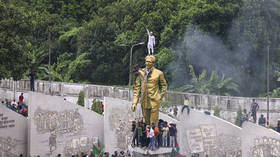Zelensky makes a mockery of India’s attempts at diplomacy

Indian Prime Minister Narendra Modi’s seven-hour trip to Ukraine on August 23 – six weeks after he met Russian President Vladimir Putin in Moscow – left many officials in New Delhi upset.
Vladimir Zelensky held a marathon briefing with the Indian media after Modi left Kiev, leaving no room for any Indian counter-argument. The briefing undermined the optics that New Delhi had sought to project and changed the whole narrative of the visit. Indian officials were indignant.
“For peace, I truly believe that a second summit has to take place,” Zelensky said. “It would be good if it were held in one of the Global South countries. We are open in that and there are countries like Saudi Arabia, Qatar, Turkey, and Switzerland as well, but that’s a different direction.”
He then suggested that India could host such a summit, but with a certain condition attached.
“I told this to Prime Minister Modi and we could have the Global Peace Summit in India. It’s a big country. It’s a great democracy, the largest. But I want to be frank… We won’t be able to conduct a peace summit in a country who hasn’t joined the communique of the peace summit,” the Ukrainian leader said, referring to India's refusal to sign the communique that emerged from Vladimir Zelensky’s ‘peace summit’ hosted by Switzerland in June this year.
“Nobody is exerting any pressure, but that is logical,” he added.
Furthermore, speaking about Indian prime minister’s visit to Moscow in July, which coincided with an attack on a children’s hospital in Kiev that Zelensky blamed on Russia, but which Moscow denied, the Ukrainian leader claimed that Modi needed to recognize that Russian President Vladimir Putin "doesn’t respect" him and India. And this didn’t go down too well with New Delhi.
The frustration in India suggests questionable planning within the country’s foreign office, because even a mid-level diplomat could have predicted that Zelensky would mount an attack on Moscow and use Modi’s visit to Russia and India’s warm relationship with it as the trigger. It was the lowest-hanging fruit of the trip for Zelensky. Yet it caught New Delhi blindsided.
The Ukraine trip probably exposes the fact that India’s foreign office no longer relies on the institutional memory that used to steer its policy. After Modi met Putin in Moscow, there had been none-too-subtle pressure from the West, particularly the United States of America, for him to trek to Kiev.
India had performed a delicate balancing act on the pressure earlier, so what changed suddenly?
India has not taken sides in the Russia-Ukraine conflict since it broke out in February 2022. It abstained from all resolutions of the United Nations that were critical of Russia and pertained to the conflict. India took a position and ignored US-led sanctions on the purchase of Russian oil and military hardware despite public criticism from the West.
India carries over with Russia the unique relationship it earlier had with the USSR – something the West finds difficult to comprehend. The institutional memory of the Indian foreign office covers the Cold War years and the time in history when US President Richard Nixon sent the Seventh Fleet, led by the aircraft carrier USS Enterprise, to the Bay of Bengal in December 1971 to threaten India during the liberation of Bangladesh and its war with Pakistan.
The Soviet Union responded to India’s request for assistance and sent a nuclear arm flotilla from Vladivostok to counter the American presence. The timely Russian move deterred the West and ensured that China didn’t open another front against India. This perspective is critical for India and ignored by the West, which would like nothing better than for India to join the grouping against Russia.
Currently, one of the biggest questions gripping diplomatic quarters in New Delhi is: Why did Modi go to Kiev at this juncture? Was he pushed? And is India seeking a mediatory role in the conflict, given its unique position with both countries?
India is one of the handful of countries, along with Türkiye, South Africa, Hungary and Indonesia, whose leaders have visited both Moscow and Kiev since the conflict broke out and there is speculation that it could be a mediator.
Zelensky went public, saying he would like to make a visit to India in November, which again caught Delhi by surprise. The prospects of Delhi holding this summit appear slim, American pressure notwithstanding.
India's Foreign Ministry is currently gripped by tentativeness and uncertainty in the third month of Prime Minister Modi’s third term – something that was not experienced during his first ten years at the helm. Things have changed, especially with foreign policy – a matter of obsession for both Modi and the mandarins, who fancy India’s global role as that of a “Vishwaguru” (world guide).
India was caught completely unaware by the events in Bangladesh, where student protests forced former prime minister Sheikh Hasina to resign and flee to India, seeking help. This was despite India’s substantial diplomatic presence with an embassy and four consulate offices around Bangladesh.
Even as speculation is rife, whispers are doing the rounds that these two embarrassments – Dhaka and Kiev – will make it a challenge for India to be an active player in the currently troubled world. The pressure would be greatest on India’s longest-serving national security adviser, A.K. Doval.
Zelensky’s grandstanding after Modi had barely taken off from Kiev certainly makes the prospects of any mediation by India unlikely. Modi doesn’t like public embarrassment, andZelensky left him red-faced in front of an Indian audience.
India has so far offered cold comfort to Kiev and Zelensky in what has become the latter’s trademark demand that India weighs in, in his favor. That is unlikely to happen as India will not take sides. “Zelensky even tried an ‘insult comedy’ for Modi from his repertoire,” an Indian diplomat said, witheringly. “He doesn’t realize Modi likes to project strength and this went down extremely badly.”
The statements, views and opinions expressed in this column are solely those of the author and do not necessarily represent those of RT.















